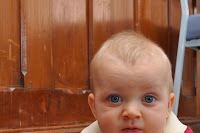My baby girl starts sex education tomorrow. She's 6 (well, 6 and three-quarters).
Of course, I went to the parent information session. I was a little concerned about what they would be teaching, having heard some of the odd PC-things going on in exotic places like Quebec, Holland and the UK. Were they going to tell my delicate little flower that I was oppressing her mum? Would they outline some of the detail of some weird fringe practices? Would she be finding out about contraception?
Imagine, if you will, my relief when I walked into the staff room and saw where the presenters were from: Centacare. If a Catholic agency can't tell them to save it for marriage, who can? (It turns out that they
can't tell them that. Apparently it's values-free sex education - isn't that a contradiction in terms!) As the presentation continued, my relief turned to support.
Before you both stop reading and start following "Conservative Christian Dad" in the blog next door, let me tell you why - for my daughter at this stage - I support what her school is doing.
The program is tailored for the age of the children. It covers things like:
- the value of families;
- where babies come from (my daughter will be told that an egg from mummy and a sperm from daddy combine to make a baby, which grows in mummy's uterus. How the egg and sperm get together is covered briefly for older grades);
- the proper names for all the bits;
- inappropriate touching, private parts, the importance of telling someone.
Most of these things she knows already. (She has some experience of different family constellations from friends at school and church, and we've always been honest with her when she's asked questions about where babies come from.) But the two big factors that lead me to support an appropriate level of sex education at her age are: the emphasis on the parent as the main educator; and the frighteningly high incidence of sexual abuse in our community.
One thing that the Centacare program stresses is that Mum or Dad should be the main source of information about the biology and morality of sex. It is really important to start early, so that kids know that they can come to Mum or Dad to talk about these things. How early is too early? Well, when you consider that the average boy will first be exposed to internet pornography aged 11, that schoolyard conversations about sex will likely happen well before that age, and that some girls can start menstruating before they are 10, we parents don't have a lot of time to spare. Most kids will ask questions to satisfy their curiosity, and will stop asking when they have enough information to be going on with. The birds and the bees talk is no one-off event; it is a conversation that should span years, off and on.
The second factor that weighs heavily in the balance is the prevalence of sexual abuse in our community. 1 in 4 girls, and 1 in 7 boys will be sexually abused during the course of their childhood. Such abuse is made easier when a child does not know whether what is happening is OK or not. In many cases, the abuse is successfully concealed (for a time at least) because a child feels shame, or thinks he will not be believed, or does not know who she can talk to. Sensitively dispelling these attitudes (without unnecessary specifics) is surely a helpful step in protecting all our kids. Even something as simple as ensuring that children know the right names for their private parts can be helpful. As a criminal lawyer in my former career, I have seen prosecutions fail or charges being downgraded because a child's evidence is too vague or general.
So I support the program - but I won't leave things in the hands of the Education Department or of Centacare. I do not believe it is possible to deliver "values-free" sex education: what we leave unsaid communicates our values as much as what we say. I'll be getting involved in the conversation so that I can show her the truth about families, marriage and sex - that God made them good, and as a good gift for us; that he made them for a purpose, and that when we misuse these gifts, we suffer as a consequence.




